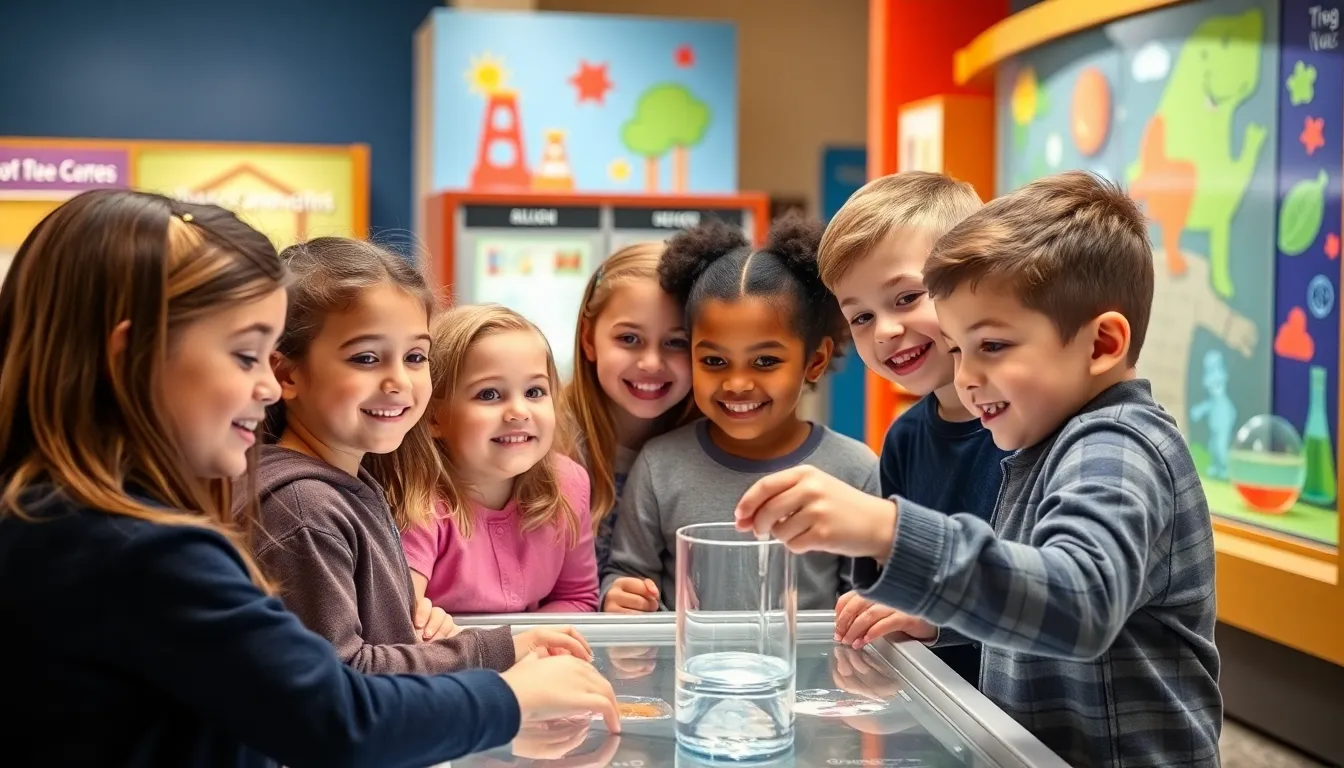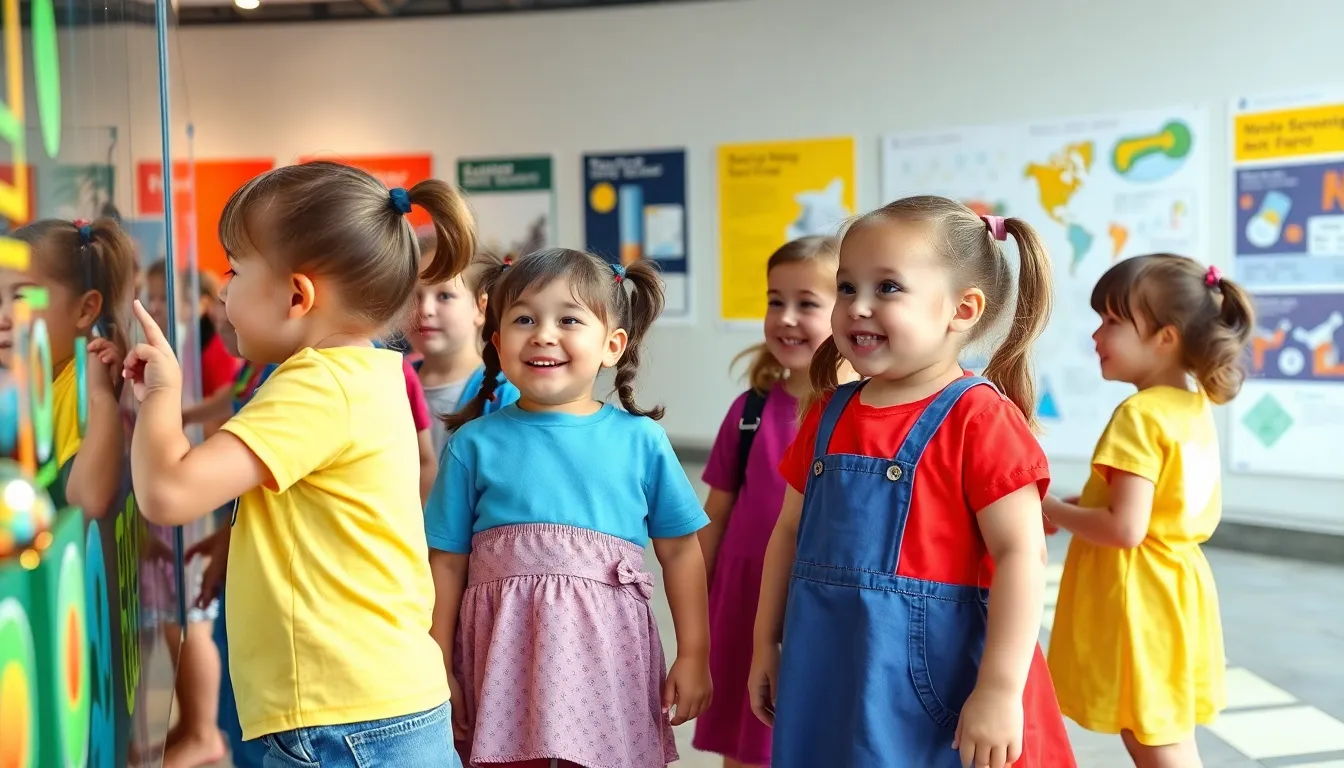Every parent knows that preschool can sometimes feel like a never-ending cycle of finger painting and snack time. But what if those tiny tots could embark on adventures that spark their curiosity and creativity? Preschool field trips are the secret ingredient to transforming mundane classroom days into unforgettable experiences.
Imagine little ones exploring the wonders of a zoo, giggling at playful animals, or venturing to a science museum, eyes wide with amazement at interactive exhibits. These outings not only break the routine but also provide hands-on learning opportunities that textbooks can’t compete with. Plus, who wouldn’t want to see their child’s face light up like a Christmas tree when they spot a giraffe? Preschool field trips are essential for fostering a love of learning and making education feel like an exciting adventure.
Table of Contents
ToggleImportance Of Preschool Field Trips
Preschool field trips play a vital role in children’s early education. Engaging with the world outside the classroom promotes exploration and wonder.
Enhancing Learning Experiences
Field trips create immersive learning opportunities that textbooks can’t replicate. Visiting places like zoos or museums opens up new concepts and ideas for young minds. Hands-on activities spark curiosity and invite children to ask questions. Learning becomes an adventure rather than a chore. Many educators report that students display greater retention of information after these excursions. Engaging directly with various subjects can solidify their understanding of nature, science, and art.
Fostering Social Skills
Field trips also provide a platform for developing essential social skills. Interaction with peers during group activities promotes teamwork and communication. Children learn to share, listen, and collaborate on projects. Observing and interacting with others in new environments builds confidence and adaptability. Children often work through challenges together, fostering problem-solving skills. Experiencing diverse settings encourages empathy and awareness of different cultures. Forming friendships during these trips can strengthen their social networks.
Types Of Preschool Field Trips

Preschool field trips can be categorized into several types, providing varied experiences for young learners. Each type serves distinct educational and developmental purposes.
Educational Trips
Educational trips offer hands-on learning experiences that enhance children’s understanding of core subjects. Visits to science centers ignite curiosity through interactive exhibits. Art museums allow children to explore creativity and appreciate various art forms. Nature reserves teach about ecosystems and different species while promoting environmental awareness. Other examples include trips to historical sites, where children can witness history firsthand. Engaging with professionals, such as scientists or artists, during these trips fosters a deeper connection to knowledge.
Recreational Trips
Recreational trips focus on fun and leisure, creating a balance between learning and play. Local parks provide opportunities for physical activity, promoting health and social skills. Children’s theaters introduce stories through performance, enriching language development. Amusement parks, while primarily for enjoyment, incorporate elements of science and mathematics through rides and games. These outings also encourage teamwork as children navigate fun challenges together. While entertainment is the core goal, valuable lessons in cooperation and communication emerge from these experiences.
Planning Preschool Field Trips
Planning preschool field trips requires thoughtful consideration and preparation. Ensuring destinations cater to young children’s interests enriches their experience.
Choosing Destinations
Selecting appropriate destinations enhances learning. Educational sites like science centers and art museums introduce children to new concepts. Nature reserves foster curiosity about the environment, while historical sites connect them to the past. It’s vital to consider accessibility and safety to ensure smooth experiences. Recreational sites, such as local parks, offer physical activities and social interactions, making learning enjoyable. Combining educational with recreational elements creates a balanced itinerary, supporting academic and social growth.
Preparing Preschoolers
Preparation sets the stage for successful field trips. Discussing the outing with preschoolers helps build anticipation. Engaging in activities related to the destination, like reading books or watching videos, reinforces their interest. Explaining safety rules fosters a sense of security, allowing children to focus on exploration. Involving caregivers enhances comfort levels, ensuring everyone enjoys the experience. Creating a checklist for items to bring, such as snacks and appropriate clothing, supports a smooth trip.
Benefits Of Preschool Field Trips
Preschool field trips offer numerous benefits that significantly enhance children’s development in various areas.
Cognitive Development
Hands-on experiences during field trips stimulate cognitive growth. Children observe real-world applications of classroom lessons, which strengthens their understanding of different subjects. The interaction with professionals at sites like science centers or museums provides insights beyond textbooks. Engaging in activities fosters critical thinking skills and promotes problem-solving. Exploration of nature reserves or historical sites encourages curiosity, leading to a deeper appreciation for the world. Overall, active learning through field trips enhances information retention, making educational concepts more relatable.
Emotional Growth
Field trips play a crucial role in emotional development for preschoolers. Exposure to new environments helps children build confidence and adaptability. Engaging in group activities fosters social skills, as they learn to communicate and collaborate with peers. Opportunities to interact with diverse cultures promote empathy and awareness of different perspectives. Additionally, these experiences create lasting memories that contribute to a positive attitude towards learning. Emotional connections formed during these trips encourage children to express themselves and nurture their self-esteem, resulting in well-rounded development.
Challenges Of Preschool Field Trips
Preschool field trips present various challenges that educators and caregivers must navigate. Addressing these challenges ensures positive experiences for young children.
Safety Concerns
Safety remains a top priority during preschool field trips. Children often explore unfamiliar surroundings, which increases the risk of accidents. Educators can implement strict supervision protocols, ensuring adequate adult-to-child ratios. Emergency plans should be in place, with clear communication among staff members. Additionally, conducting pre-trip assessments of destinations can identify potential hazards, while reviewing safety guidelines with children prepares them for different situations. Equipment like first aid kits must accompany each trip, reinforcing preparedness and care.
Logistics And Planning
Logistical challenges can complicate preschool field trips. Selecting convenient and accessible locations minimizes travel issues. Educators should book attractions in advance, often securing group discounts. Creating detailed itineraries, including trip timelines and activity schedules, keeps everyone organized. Utilizing checklists for necessary supplies, such as snacks and materials, further streamlines the process. Open communication with parents or guardians builds trust and ensures that caregivers are informed about the plans. Engaging children in interactive discussions beforehand helps them feel prepared and excited for the outing.
Preschool field trips play a vital role in enriching children’s educational experiences. They not only ignite curiosity but also foster a deeper understanding of the world around them. By engaging in hands-on activities children learn to explore and appreciate various subjects while developing essential social skills.
With thoughtful planning and safety measures in place these outings can create memorable adventures that significantly contribute to a child’s emotional and cognitive growth. The balance of education and recreation makes these trips an invaluable part of early childhood development. As children venture beyond the classroom they gain confidence and a lifelong love of learning.



